The Role of Accounting Concepts in Preparing Financial Statements
VerifiedAdded on 2023/06/10
|6
|1445
|189
Essay
AI Summary
This essay explores six key accounting concepts essential for preparing financial statements: the business entity concept, which differentiates between the company and its owner; the money measurement concept, which requires transactions to be recorded in monetary terms; the going concern concept, which assumes a business will operate indefinitely; the accounting period concept, which divides business activity into specific time periods; the accounting cost concept, which records assets at their historical cost; and the dual aspect concept, which recognizes that every transaction affects at least two accounts. The essay emphasizes the importance of these concepts in maintaining consistency and accuracy in financial reporting, enabling investors and stakeholders to analyze a company's financial position and growth effectively. Desklib provides access to this document and many other solved assignments for students.
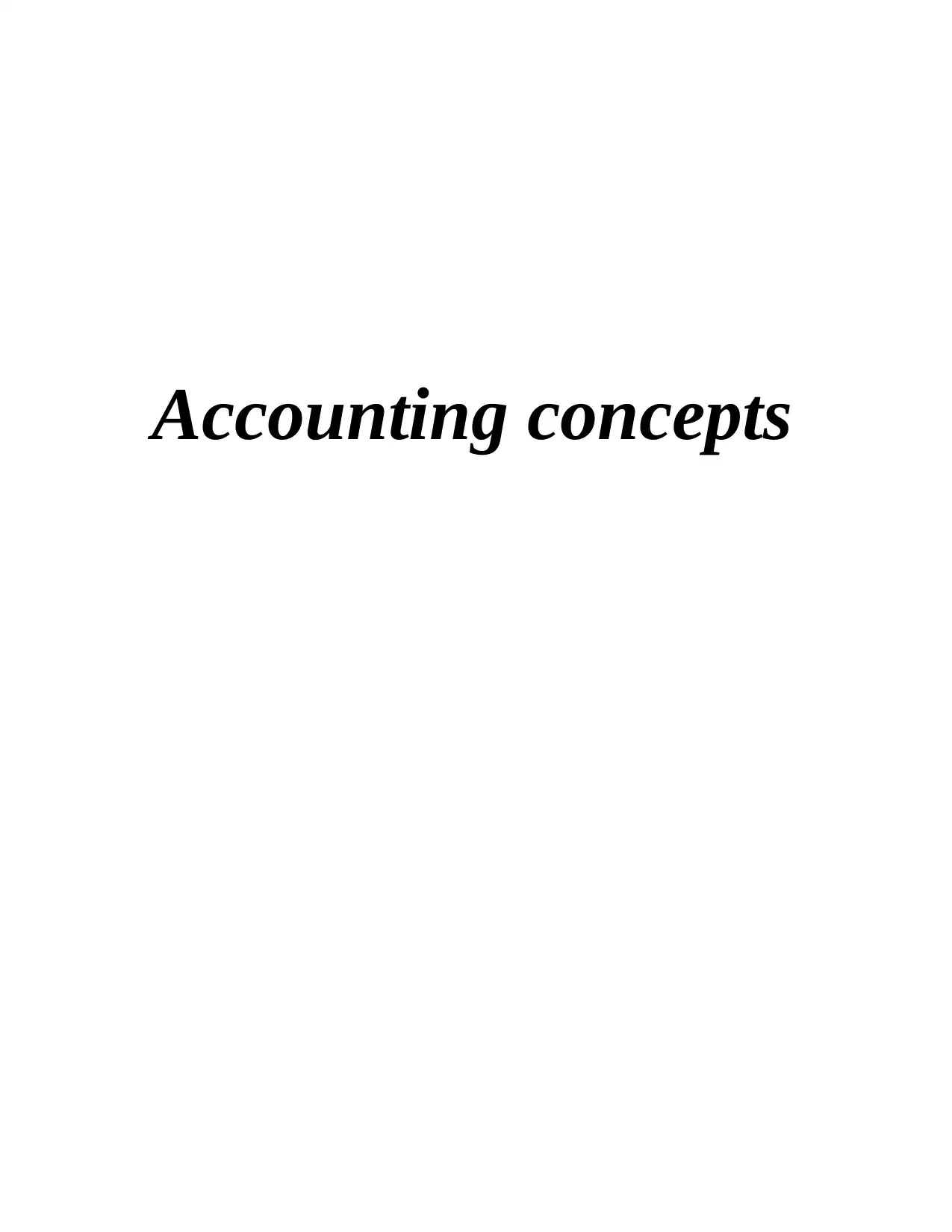
Accounting concepts
Paraphrase This Document
Need a fresh take? Get an instant paraphrase of this document with our AI Paraphraser

Table of Contents
INTRODUCTION ..........................................................................................................................3
CONCLUSION ...............................................................................................................................5
REFERENCES................................................................................................................................6
INTRODUCTION ..........................................................................................................................3
CONCLUSION ...............................................................................................................................5
REFERENCES................................................................................................................................6
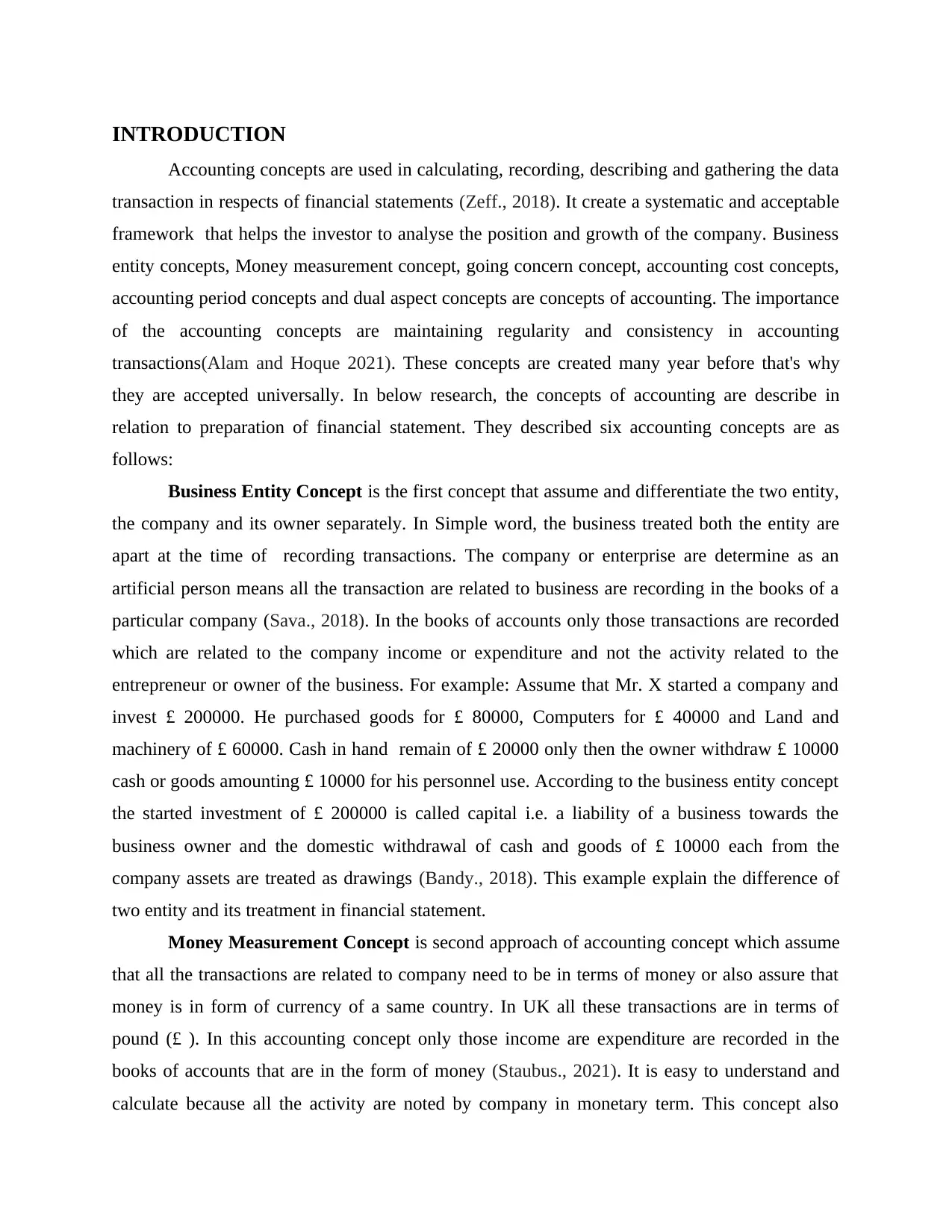
INTRODUCTION
Accounting concepts are used in calculating, recording, describing and gathering the data
transaction in respects of financial statements (Zeff., 2018). It create a systematic and acceptable
framework that helps the investor to analyse the position and growth of the company. Business
entity concepts, Money measurement concept, going concern concept, accounting cost concepts,
accounting period concepts and dual aspect concepts are concepts of accounting. The importance
of the accounting concepts are maintaining regularity and consistency in accounting
transactions(Alam and Hoque 2021). These concepts are created many year before that's why
they are accepted universally. In below research, the concepts of accounting are describe in
relation to preparation of financial statement. They described six accounting concepts are as
follows:
Business Entity Concept is the first concept that assume and differentiate the two entity,
the company and its owner separately. In Simple word, the business treated both the entity are
apart at the time of recording transactions. The company or enterprise are determine as an
artificial person means all the transaction are related to business are recording in the books of a
particular company (Sava., 2018). In the books of accounts only those transactions are recorded
which are related to the company income or expenditure and not the activity related to the
entrepreneur or owner of the business. For example: Assume that Mr. X started a company and
invest £ 200000. He purchased goods for £ 80000, Computers for £ 40000 and Land and
machinery of £ 60000. Cash in hand remain of £ 20000 only then the owner withdraw £ 10000
cash or goods amounting £ 10000 for his personnel use. According to the business entity concept
the started investment of £ 200000 is called capital i.e. a liability of a business towards the
business owner and the domestic withdrawal of cash and goods of £ 10000 each from the
company assets are treated as drawings (Bandy., 2018). This example explain the difference of
two entity and its treatment in financial statement.
Money Measurement Concept is second approach of accounting concept which assume
that all the transactions are related to company need to be in terms of money or also assure that
money is in form of currency of a same country. In UK all these transactions are in terms of
pound (£ ). In this accounting concept only those income are expenditure are recorded in the
books of accounts that are in the form of money (Staubus., 2021). It is easy to understand and
calculate because all the activity are noted by company in monetary term. This concept also
Accounting concepts are used in calculating, recording, describing and gathering the data
transaction in respects of financial statements (Zeff., 2018). It create a systematic and acceptable
framework that helps the investor to analyse the position and growth of the company. Business
entity concepts, Money measurement concept, going concern concept, accounting cost concepts,
accounting period concepts and dual aspect concepts are concepts of accounting. The importance
of the accounting concepts are maintaining regularity and consistency in accounting
transactions(Alam and Hoque 2021). These concepts are created many year before that's why
they are accepted universally. In below research, the concepts of accounting are describe in
relation to preparation of financial statement. They described six accounting concepts are as
follows:
Business Entity Concept is the first concept that assume and differentiate the two entity,
the company and its owner separately. In Simple word, the business treated both the entity are
apart at the time of recording transactions. The company or enterprise are determine as an
artificial person means all the transaction are related to business are recording in the books of a
particular company (Sava., 2018). In the books of accounts only those transactions are recorded
which are related to the company income or expenditure and not the activity related to the
entrepreneur or owner of the business. For example: Assume that Mr. X started a company and
invest £ 200000. He purchased goods for £ 80000, Computers for £ 40000 and Land and
machinery of £ 60000. Cash in hand remain of £ 20000 only then the owner withdraw £ 10000
cash or goods amounting £ 10000 for his personnel use. According to the business entity concept
the started investment of £ 200000 is called capital i.e. a liability of a business towards the
business owner and the domestic withdrawal of cash and goods of £ 10000 each from the
company assets are treated as drawings (Bandy., 2018). This example explain the difference of
two entity and its treatment in financial statement.
Money Measurement Concept is second approach of accounting concept which assume
that all the transactions are related to company need to be in terms of money or also assure that
money is in form of currency of a same country. In UK all these transactions are in terms of
pound (£ ). In this accounting concept only those income are expenditure are recorded in the
books of accounts that are in the form of money (Staubus., 2021). It is easy to understand and
calculate because all the activity are noted by company in monetary term. This concept also
⊘ This is a preview!⊘
Do you want full access?
Subscribe today to unlock all pages.

Trusted by 1+ million students worldwide
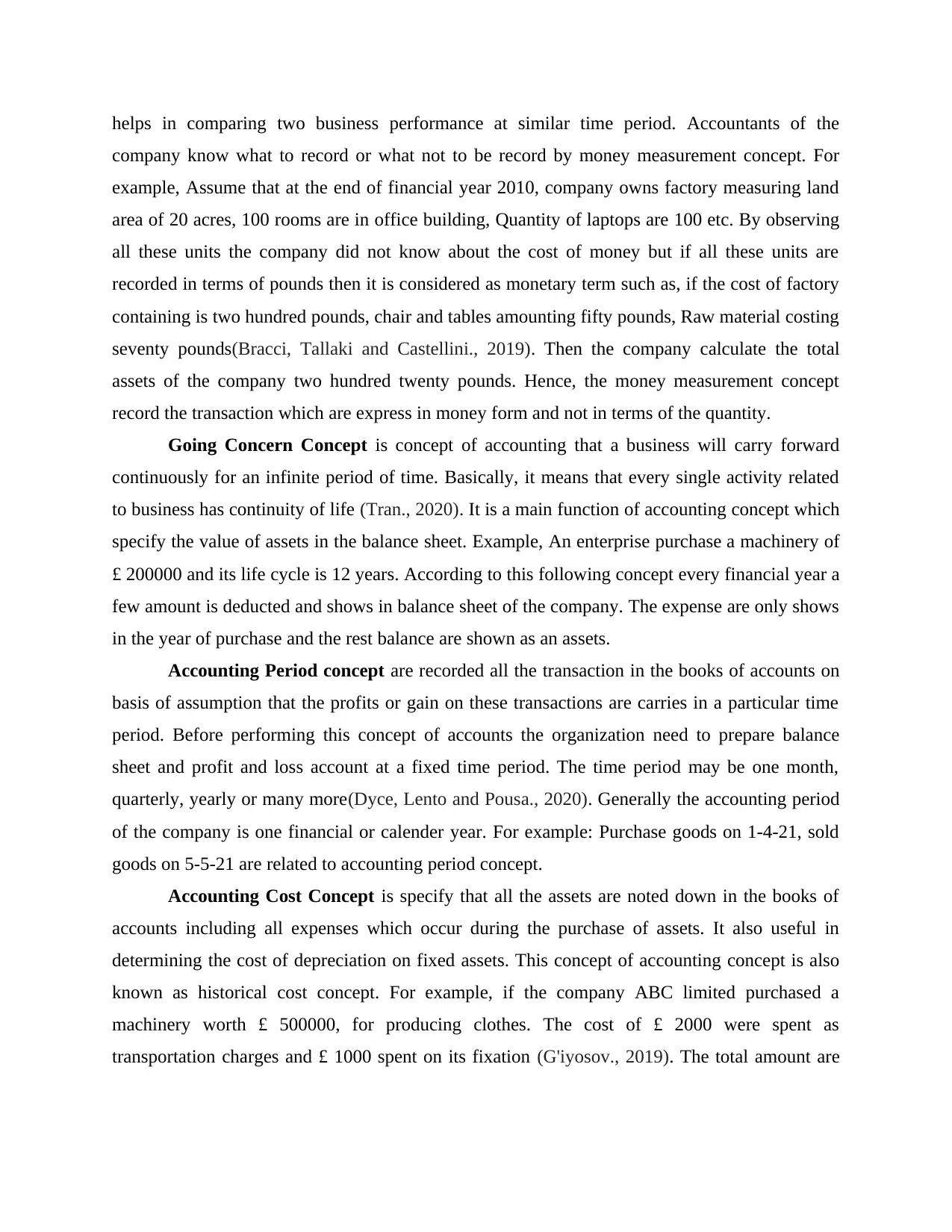
helps in comparing two business performance at similar time period. Accountants of the
company know what to record or what not to be record by money measurement concept. For
example, Assume that at the end of financial year 2010, company owns factory measuring land
area of 20 acres, 100 rooms are in office building, Quantity of laptops are 100 etc. By observing
all these units the company did not know about the cost of money but if all these units are
recorded in terms of pounds then it is considered as monetary term such as, if the cost of factory
containing is two hundred pounds, chair and tables amounting fifty pounds, Raw material costing
seventy pounds(Bracci, Tallaki and Castellini., 2019). Then the company calculate the total
assets of the company two hundred twenty pounds. Hence, the money measurement concept
record the transaction which are express in money form and not in terms of the quantity.
Going Concern Concept is concept of accounting that a business will carry forward
continuously for an infinite period of time. Basically, it means that every single activity related
to business has continuity of life (Tran., 2020). It is a main function of accounting concept which
specify the value of assets in the balance sheet. Example, An enterprise purchase a machinery of
£ 200000 and its life cycle is 12 years. According to this following concept every financial year a
few amount is deducted and shows in balance sheet of the company. The expense are only shows
in the year of purchase and the rest balance are shown as an assets.
Accounting Period concept are recorded all the transaction in the books of accounts on
basis of assumption that the profits or gain on these transactions are carries in a particular time
period. Before performing this concept of accounts the organization need to prepare balance
sheet and profit and loss account at a fixed time period. The time period may be one month,
quarterly, yearly or many more(Dyce, Lento and Pousa., 2020). Generally the accounting period
of the company is one financial or calender year. For example: Purchase goods on 1-4-21, sold
goods on 5-5-21 are related to accounting period concept.
Accounting Cost Concept is specify that all the assets are noted down in the books of
accounts including all expenses which occur during the purchase of assets. It also useful in
determining the cost of depreciation on fixed assets. This concept of accounting concept is also
known as historical cost concept. For example, if the company ABC limited purchased a
machinery worth £ 500000, for producing clothes. The cost of £ 2000 were spent as
transportation charges and £ 1000 spent on its fixation (G'iyosov., 2019). The total amount are
company know what to record or what not to be record by money measurement concept. For
example, Assume that at the end of financial year 2010, company owns factory measuring land
area of 20 acres, 100 rooms are in office building, Quantity of laptops are 100 etc. By observing
all these units the company did not know about the cost of money but if all these units are
recorded in terms of pounds then it is considered as monetary term such as, if the cost of factory
containing is two hundred pounds, chair and tables amounting fifty pounds, Raw material costing
seventy pounds(Bracci, Tallaki and Castellini., 2019). Then the company calculate the total
assets of the company two hundred twenty pounds. Hence, the money measurement concept
record the transaction which are express in money form and not in terms of the quantity.
Going Concern Concept is concept of accounting that a business will carry forward
continuously for an infinite period of time. Basically, it means that every single activity related
to business has continuity of life (Tran., 2020). It is a main function of accounting concept which
specify the value of assets in the balance sheet. Example, An enterprise purchase a machinery of
£ 200000 and its life cycle is 12 years. According to this following concept every financial year a
few amount is deducted and shows in balance sheet of the company. The expense are only shows
in the year of purchase and the rest balance are shown as an assets.
Accounting Period concept are recorded all the transaction in the books of accounts on
basis of assumption that the profits or gain on these transactions are carries in a particular time
period. Before performing this concept of accounts the organization need to prepare balance
sheet and profit and loss account at a fixed time period. The time period may be one month,
quarterly, yearly or many more(Dyce, Lento and Pousa., 2020). Generally the accounting period
of the company is one financial or calender year. For example: Purchase goods on 1-4-21, sold
goods on 5-5-21 are related to accounting period concept.
Accounting Cost Concept is specify that all the assets are noted down in the books of
accounts including all expenses which occur during the purchase of assets. It also useful in
determining the cost of depreciation on fixed assets. This concept of accounting concept is also
known as historical cost concept. For example, if the company ABC limited purchased a
machinery worth £ 500000, for producing clothes. The cost of £ 2000 were spent as
transportation charges and £ 1000 spent on its fixation (G'iyosov., 2019). The total amount are
Paraphrase This Document
Need a fresh take? Get an instant paraphrase of this document with our AI Paraphraser
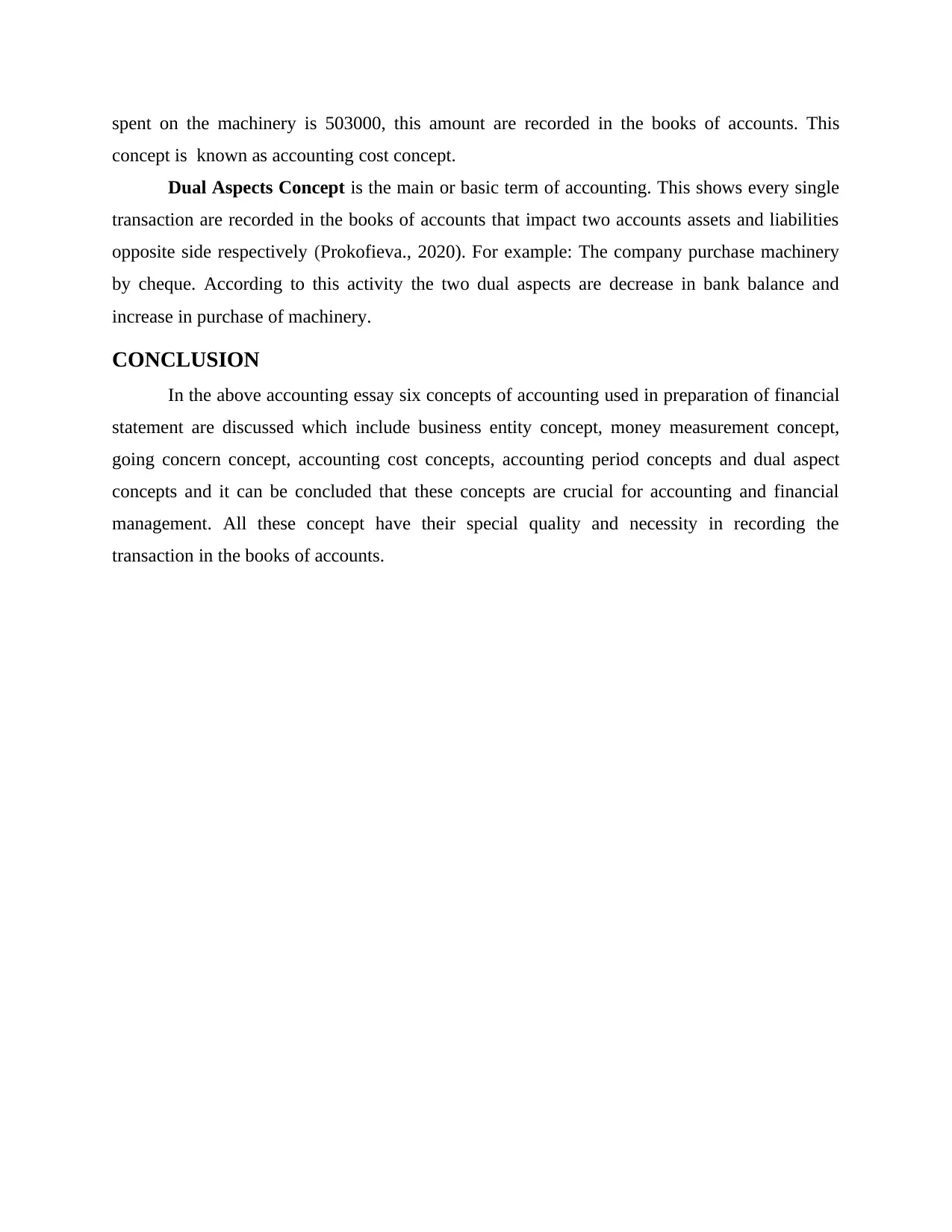
spent on the machinery is 503000, this amount are recorded in the books of accounts. This
concept is known as accounting cost concept.
Dual Aspects Concept is the main or basic term of accounting. This shows every single
transaction are recorded in the books of accounts that impact two accounts assets and liabilities
opposite side respectively (Prokofieva., 2020). For example: The company purchase machinery
by cheque. According to this activity the two dual aspects are decrease in bank balance and
increase in purchase of machinery.
CONCLUSION
In the above accounting essay six concepts of accounting used in preparation of financial
statement are discussed which include business entity concept, money measurement concept,
going concern concept, accounting cost concepts, accounting period concepts and dual aspect
concepts and it can be concluded that these concepts are crucial for accounting and financial
management. All these concept have their special quality and necessity in recording the
transaction in the books of accounts.
concept is known as accounting cost concept.
Dual Aspects Concept is the main or basic term of accounting. This shows every single
transaction are recorded in the books of accounts that impact two accounts assets and liabilities
opposite side respectively (Prokofieva., 2020). For example: The company purchase machinery
by cheque. According to this activity the two dual aspects are decrease in bank balance and
increase in purchase of machinery.
CONCLUSION
In the above accounting essay six concepts of accounting used in preparation of financial
statement are discussed which include business entity concept, money measurement concept,
going concern concept, accounting cost concepts, accounting period concepts and dual aspect
concepts and it can be concluded that these concepts are crucial for accounting and financial
management. All these concept have their special quality and necessity in recording the
transaction in the books of accounts.
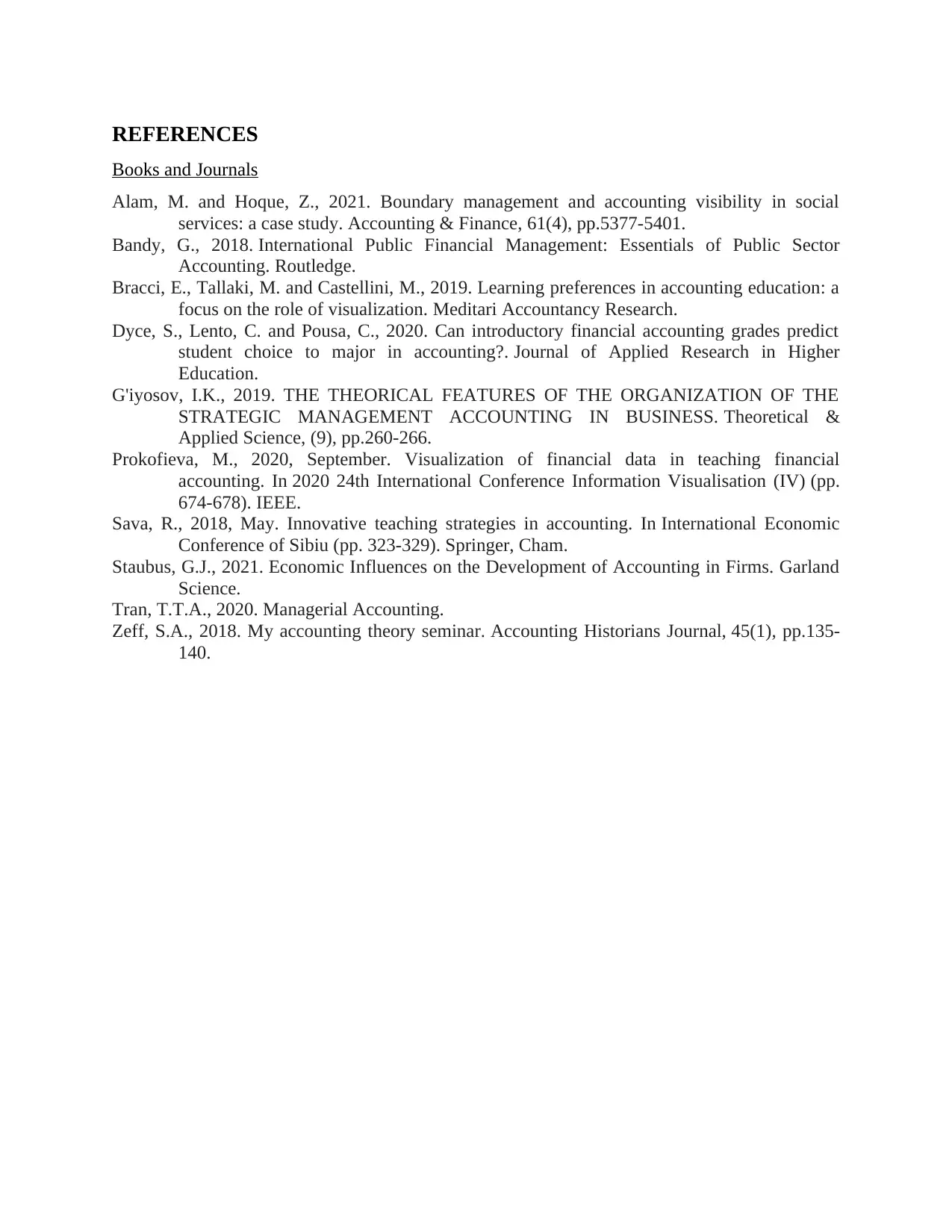
REFERENCES
Books and Journals
Alam, M. and Hoque, Z., 2021. Boundary management and accounting visibility in social
services: a case study. Accounting & Finance, 61(4), pp.5377-5401.
Bandy, G., 2018. International Public Financial Management: Essentials of Public Sector
Accounting. Routledge.
Bracci, E., Tallaki, M. and Castellini, M., 2019. Learning preferences in accounting education: a
focus on the role of visualization. Meditari Accountancy Research.
Dyce, S., Lento, C. and Pousa, C., 2020. Can introductory financial accounting grades predict
student choice to major in accounting?. Journal of Applied Research in Higher
Education.
G'iyosov, I.K., 2019. THE THEORICAL FEATURES OF THE ORGANIZATION OF THE
STRATEGIC MANAGEMENT ACCOUNTING IN BUSINESS. Theoretical &
Applied Science, (9), pp.260-266.
Prokofieva, M., 2020, September. Visualization of financial data in teaching financial
accounting. In 2020 24th International Conference Information Visualisation (IV) (pp.
674-678). IEEE.
Sava, R., 2018, May. Innovative teaching strategies in accounting. In International Economic
Conference of Sibiu (pp. 323-329). Springer, Cham.
Staubus, G.J., 2021. Economic Influences on the Development of Accounting in Firms. Garland
Science.
Tran, T.T.A., 2020. Managerial Accounting.
Zeff, S.A., 2018. My accounting theory seminar. Accounting Historians Journal, 45(1), pp.135-
140.
Books and Journals
Alam, M. and Hoque, Z., 2021. Boundary management and accounting visibility in social
services: a case study. Accounting & Finance, 61(4), pp.5377-5401.
Bandy, G., 2018. International Public Financial Management: Essentials of Public Sector
Accounting. Routledge.
Bracci, E., Tallaki, M. and Castellini, M., 2019. Learning preferences in accounting education: a
focus on the role of visualization. Meditari Accountancy Research.
Dyce, S., Lento, C. and Pousa, C., 2020. Can introductory financial accounting grades predict
student choice to major in accounting?. Journal of Applied Research in Higher
Education.
G'iyosov, I.K., 2019. THE THEORICAL FEATURES OF THE ORGANIZATION OF THE
STRATEGIC MANAGEMENT ACCOUNTING IN BUSINESS. Theoretical &
Applied Science, (9), pp.260-266.
Prokofieva, M., 2020, September. Visualization of financial data in teaching financial
accounting. In 2020 24th International Conference Information Visualisation (IV) (pp.
674-678). IEEE.
Sava, R., 2018, May. Innovative teaching strategies in accounting. In International Economic
Conference of Sibiu (pp. 323-329). Springer, Cham.
Staubus, G.J., 2021. Economic Influences on the Development of Accounting in Firms. Garland
Science.
Tran, T.T.A., 2020. Managerial Accounting.
Zeff, S.A., 2018. My accounting theory seminar. Accounting Historians Journal, 45(1), pp.135-
140.
⊘ This is a preview!⊘
Do you want full access?
Subscribe today to unlock all pages.

Trusted by 1+ million students worldwide
1 out of 6
Related Documents
Your All-in-One AI-Powered Toolkit for Academic Success.
+13062052269
info@desklib.com
Available 24*7 on WhatsApp / Email
![[object Object]](/_next/static/media/star-bottom.7253800d.svg)
Unlock your academic potential
Copyright © 2020–2025 A2Z Services. All Rights Reserved. Developed and managed by ZUCOL.




